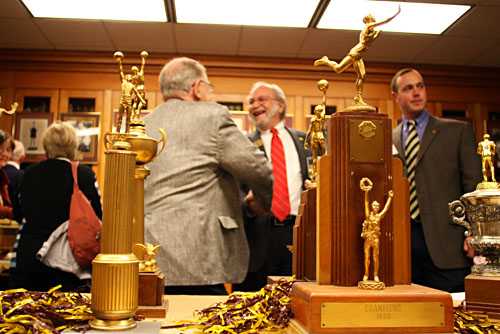The Loyola community received a rare opportunity Jan. 20 to travel back in time and discover Wolfpack Athletics’ rich history, since its beginnings in 1912.
Former athletes and Loyola staff members gathered on the third floor of the J. Edgar and Louise S. Monroe Library to view and enjoy the history of Loyola’s athletics program. Objects on display included pictures of the university’s hall of famers, old jerseys, banners and equipment, as well as informative placards with facts about Loyola’s journey from then to now.
In 1958, Anne Berrigan was the only female to work or play in the entire athletics department. In the fall of 1959, a newly appointed athletic director said it wasn’t proper for her to be playing on the men’s tennis team, and she ended her Loyola athletic career.
Charley Powell was an All-American athlete and the first African American to sign an athletics scholarship at a previously all-white college in Louisiana. In 1967, Powell decided to come to Loyola, despite having 25 colleges to choose from, and during his freshman year, Loyola upset Michigan State, 74-70, the number three team in the nation. During his junior year, he scored an average of 26 points per game. Currently ranked fourth in scoring, he left Loyola ranked first, with 1,525 career points.
Most of the athletes being honored didn’t play in The Den; they played in other facilities, or on the football field. In 1923, Loyola Stadium was built to hold 16,000 people. However, it was demolished in 1946. The first facility in the school was built in 1925 and was called “The Gym.” It had dressing rooms, a basketball court, a ticket office and two athletic offices. During that time, three private residences on Marquette Place were bought and used as dorms for athletes.
The Field House, another historic venue, was constructed in 1951 and completed in 1954. The $700,000 building could fit 6,500 people and saw many victories for Loyola, including Powell’s over Michigan State. The Field House was torn down in 1972, however, to make rooms for what became today’s Residential Quad.
Jack Morris, A ‘60, played basketball and baseball while at Loyola still resides in New Orleans. “I live here and support the program and it just sounded like a good opportunity to see old friends,” he said.
The exhibit also honored coaches that have been a part of the athletics program. John “Jack” Orsely, basketball coach, led the Wolfpack to the National Association of Intercollegiate Athletics championship in 1945 and won it. He also coached the baseball team.
“It feels great to see all these things in display and makes me proud to be a part of it,” Morris said. “Seeing these pictures, makes me realize it was a long time ago and it brings me back to a lot of good old memories I made here.”
To many people’s surprise, Loyola had boxing. While at Loyola in 1932, Eddie Flynn won an Olympic gold medal, and was the U.S. amateur welterweight champion in 1931 and 1932. Former amateur boxer and current president of Loyola, the Rev. Kevin Wildes, S.J., also attended. He said his attendance is part of a continuing effort to back the athletics program. “This is a great way for people who were so committed to the university to get involved. We are trying to find other ways to support athletics and help it grow and develop,” he said.
Michael Giorlando, Director of Intercollegiate Athletics, was happy with the outcome of the program.
“I’m so pleased with the tremendous crowd that came. It’s great seeing many of the folks that touched the past and they had a great time reminiscing and seeing all the artifacts,” Giorlando said. “As Director of Athletics and Wellness, it makes me very proud to be in charge of this system that has touched so many lives.” This exhibit, also gave him the opportunity to compare the way athletics was to the way it is today.
“I’ve seen their love for Loyola. Their love to get a top notch degree and play under some wonderful people that coached them,” he said. Giorlando added that it’s his job and the coaches’ to make sure athletes understand the history of Loyola.
“I’m so humbled and honored to be a part of this. Being a New Orleanian and seeing the history of this university and what it means to this city, from an academic point of view, from a community stand point, and the way that the athletes, then and now, are making a difference,” he said.
Even though all these athletes are remembered for their athletic achievements, those in attendance agreed obtaining a degree from Loyola meant more than all the athletic achievements, showing that being a student-athlete means putting academics first.
Eduardo Gonzalez can be reached at [email protected].

David Robinson-Morris, A ’06, welcomes alumni and visitors to Loyola’s Maroon and Gold reception Tuesday, Jan. 21.







